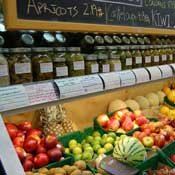Checking the expiration date on a meat package is as important as knowing whether the meat is loaded with chemicals and hormones. A constant complaint of buying organic foods is the comparatively higher prices, but the counter-argument is how important the long-term effects are compared to the instant gratification of buying cheaper food. If a consumer is able to purchase a laptop, a smartphone, a television with cable and many more luxuries, then the same consumer is able to buy foods that will not affect the body as badly as corn-fed beef or pesticide-soaked vegetables.
You can begin shopping responsibly by going to the nearest grocery store and inquiring whether the store carries organic products. Due to increased awareness of the unsanitary nature of meat processing and unnatural chemicals implanted in vegetables, a grocery store will like carry organic products as well as the consumer-popular brands.
Kroger has added more organic products in the past few years.
More people wanted natural or organic food, says John Crosby, senior co-manager of the Interstate 55 Kroger. "We even have organic bags in which they can package their groceries."
To find organics, search for the USDA approval seal. This means that vegetables are at least 95 percent organic, grown free of pesticides and synthetic fertilizers. Kroger stores offer many fruits and vegetables with this seal.
As for the meat selection, customers can choose grain-fed beef, which meets the USDA standards. Grain-fed isn't nearly as organic as grass-fed, but it meets the USDA requirements nonetheless.
Chickens sold at Kroger are labeled "free-range," meaning they were grown outside of a confined cage; however, this label should be taken with caution because one could raise chickens under someone's sink, and the meat could be labeled as free-range simply because they were grown outside of a cage.
"Natural" is not the same as "organic." We tend to think natural foods don't have synthetic additives, but neither the U.S. Department of Agriculture nor the Food and Drug Administration has rules defining "natural."
It may be a better option, but maybe not. Organic foods, in contrast, are heavily regulated. They must be free of most synthetic chemicals or additives, and grown without hormones, pesticides, or antibiotics and other drugs, among other restrictions.
"We do have a section set aside: Nature's Market," Crosby says. "It's where we sell organic products besides meat and vegetables."
Nature's Market features items from dish soap to gluten-free snacks to non-dairy drinks. There are organic baby foods, tea and pasta.
If you do want more organic options such as grass-fed beef, then head to Rainbow Natural Grocery Cooperative in Fondren. Open since 1980, the strictly organic grocery store has expanded into a bakery and High Noon Café, which are both vegetarian-friendly. Rainbow offers certified organically grown meat and vegetables. It is the only store in Jackson, if not Mississippi, that is completely organic.
"We do try to make it as local as we can," says Patrick Jerome, manager of Rainbow Natural Grocery, "but that can be difficult when there aren't many organic farmers nearby."
The store has grass-fed beef, free-range organic chicken, and local catfish from Clarksdale as well as Burt's Bees organic skin care (among others), varieties of granola and organic baby food.
It may seem like a daunting task to shop organically in Mississippi where few farmers and ranchers have embraced organic methods, in spite of their increased popularity.
Only two organic producers sell at farmers markets in Jackson, and Mississippi has only one state-certified inspector who determines whether the methods and the products are organic.
However, despite those challenges, it is possible to purchase and consume organic products. Keep an eye out for labels such as "organic" for completely synthetic-free material foods, "natural" for foods made with natural ingredients, and "grass-fed" for healthy, normally grown, lean beef and lamb.
Websites such as http://www.happycow.net and http://www.localharvest.org can help locate organic and vegetarian-friendly grocery stores, restaurants and farms in Mississippi. And never fear to ask a store employee whether the store carries organic products.
The long-term effects of buying admittedly more expensive organic products are tremendously beneficial as compared to synthetic, hazardous consumer products. Although the specifics are too numerous to mention here, factory foods and factory-farm practices may be a danger to your health.
"The growing consensus among scientists is that small doses of pesticides and other chemicals can cause lasting damage to human health, especially during fetal development and early childhood," states the Environmental Working Group on
its website.
The European Union banned the use of most hormones in foods in 1988, banning sales of beef from the United States in 1989 due to U.S. feedlots' practice of using sex hormones to fatten cattle before slaughter. In addition to prohibiting the use of hormones, organic practices also prohibit antibiotics.
Antibiotic overuse "could have profound consequences for treatment of disease in humans, including the serious dangers of antibiotic-resistant bacteria," states the Organic Trade Association website.
Your body and your family will thank you for double-checking labels to choose safer, healthier and organic foods.
Say 'No' to Pesticides
The Environmental Working Group is a nonprofit organization whose mission is to use the power of public information to protect public health and the environment. Each year, the group publishes its lists of the most pesticide-laden and pesticide-free fruits and vegetables. Download a handy wallet card (or an iPhone app) of this year's list to take shopping with you at http://www.foodnews.org.
Dirty Dozen
Try to always buy these foods organically when possible.
Celery
Peaches
Strawberries
Apples
Blueberries
Nectarines
Bell Peppers
Spinach
Cherries
Kale/Collard
Greens
Potatoes
Grapes (Imported)
Clean 15
Farmers use the least pesticides on these foods.
Onions
Avocado
Sweet Corn
Pineapple
Mangos
Sweet Peas
Asparagus
Kiwi
Cabbage
Eggplant
Cantaloupe
Watermelon
Grapefruit
Sweet Potato
Honeydew Melon
Opened in 1980, Rainbow Natural Grocery Cooperative's mission is to provide natural and organic products and services at the lowest possible cost.



Comments
Use the comment form below to begin a discussion about this content.
comments powered by Disqus